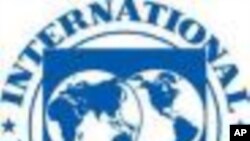The International Monetary Fund has warned of the risk of further political instability in Zimbabwe as the power-sharing parties in Harare's unity government remain divided over implementation of the 2008 Global Political Agreement and much-needed reforms.
The IMF said the continuation of Zimbabwe's fragile economic recovery was vulnerable to a global decline in commodity prices and financial deficits accumulating in 2011.
In a report issued this week in Washington after Article IV consultations in Harare during March, the Fund said growth is likely to be dampened by investor apprehension over the fast-track indigenization program aiming to give local black investors a controlling 51 percent stake in foreign-owned mines. It said growth could subside to 5.5 percent.
Despite historically high commodity prices and government borrowing at market interest rates, the IMF said, a deficit is likely to emerge in 2011 as revenues flatten out.
Under a scenario in which current government policies do not change, "revenues are projected to remain broadly unchanged ... compared with 2010,” the IMF report said. It concluded that “this implies a revenue shortfall of 1.6% of gross domestic product.”
Access to foreign funding is uncertain beyond 2012 due to political tension, the report said. “The political tensions surrounding the pre-election debate are complicating economic policy making and implementing timely policy measures will solidify the economic recovery and reduce acute vulnerabilities,” the IMF said.
Donors are expected to contribute about US$770 million in off-budget aid including food assistance, medicine and expenditures from the Multi-Donor Trust Fund.
If the political situation in the country improves, the report said, nominal revenues would be significantly higher mainly owing to stronger growth in 2011.
The IMF said Zimbabwe should keep its multiple hard currency regime for the next few years, though inflation may rise over the 4 percent target on fuel and wage costs.
It said Harare should reduce public wage costs to 40 percent of revenue by 2016 to as to make room for priority expenditures and to accumulate reserves.
“In 2011, employment costs including wages, benefits and pensions are projected to increase by 45 percent to US$1.54 billion, well above the budgeted US$1.4 billion.”
The IMF noted that the government of Zimbabwe has a payroll of 38,000 public servants, with many irregularities including an estimated 14,000 "ghost workers."
Economist Tony Hawkins said the IMF report predicting a 12-month inflation rate of 7 percent by December of this year is likely to be borne out.
Economic commentator Bekithemba Mmhlanga said Zimbabwe can avert an economic slowdown by coming up with policies that promote growth.
Business leaders in Bulawayo, meanwhile, have criticized a ministerial task force set up by the government to address industrial flight from Bulawayo, most of whose members failed to attend a meeting called by the city’s businesses.
Bulawayo Chamber of Commerce Chairman Isaac Mabuka said only two members of the task force - Industry Minister Welshman Ncube and Water Development Minister Samuel Sipepa Nkomo – showed up for the meeting on Thursday.
Business leaders told the task force members they need credit lines – in the case of some companies at least US$500,000 in working capital.
Some 87 companies have closed since 2009 leaving 20,000 people in Bulawayo jobless. Harare has asked South Africa for a US$50 million emergency finance package.
Chamber of Commerce Chairman Mabuka said the government must get serious about helping industries in Bulawayo, once regarded as Zimbabwe’s industrial hub.




